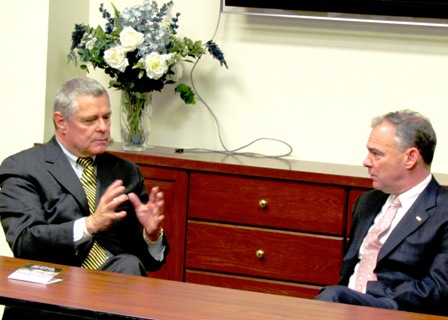
“It’s time to solve the issue of Visa reform,” said U. S. Senator Tim Kaine at the Roanoke Regional Chamber of Commerce on Wednesday. Highly skilled talent is needed for unfilled high-tech jobs in the U.S.
Forcing highly skilled educated college graduates back to their country of origin after graduation is the wrong thing to do when the talent is needed here, says Kaine. The immigration bill is a 13-year path to citizenship and it is not amnesty, he said. “It’s about family reunification and helping employers with an E-verify system that really works for them.”
Roanoke technology talent is in short supply as one business owner told Sen. Kaine. “There is a mismatch of talent.” Of four IT developer openings he was only able to fill one.
There is strong support from the business community for immigration reform but Kaine said “there are people who are on all sides of the issue.” He still feels secure in the bill’s passage sometime in June.
A late hitch came when Vermont Democratic Sen. Patrick Leahy said he planned to offer an amendment allowing foreign-born individuals in committed same-sex relationships with Americans to apply for green cards. Florida Republican Sen. Marco Rubio said adding such a provision would jeopardize the entire bill. “This immigration bill is difficult enough as it is.”
Joyce Waugh, president and secretary of the Roanoke Regional Chamber of Commerce, feared the lingering threat of the closure of Roanoke’s U.S. Postal Service distribution center. Mail would have to be routed through Greensboro, NC causing delivery delays. “The reality is that businesses will not be able to do business in a timely fashion,” said Waugh.
Sen. Kaine explained that in addition to sequestration and the normal budgetary challenges the U.S. Postal Service is required by Congress to prefund their pension operations. A solution will require balancing their budget and resolution of the pension fund quagmire.
Former state Senator Granger McFarlane asked Sen. Kaine to help reinvigorate the railroad intermodal transfer station project. “There’s a lot of foot-dragging going on,” said McFarlane. He asked that both Senator Kaine and Warner write a letter or call Norfolk Southern’s CEO Charles “Wick” Moorman, the Secretary of Transportation and Governor McDonnell to get it back on track. “If we lose it – it’s going to hurt this area.”
Dan Motley, of the Norfolk Southern Corporation and Chamber chair said that they just don’t have customers lined up asking them to build it. McFarlane made the case that it would save time and fuel and “that would certainly mean something to the customers.”
Kaine said, “I can’t create customers” but he would make inquiries. The economy faltered as years of lawsuits forced customers to look elsewhere. As governor during that time Kaine remembered that lawsuit well.
Asked later if a decrease in coal production was placing downward pressure on Norfolk Southern business, Motley said that metallurgical coal was filling the gap in lagging domestic coal shipments. Metallurgic coal is being shipped overseas for steel production, he said. Domestic coal used by electric power plants is being replaced by cheaper cleaner natural gas that meets new EPA emission standards.
Other topics of concern included the threat of the elimination of tax-exempt municipal bonds. Taxing municipal bonds would mean Roanoke City would have to pay higher rates on debt and result in the city having to forgo its infrastructure needs, said City Manager Chris Morrill.
Sen. Kaine said that with recent cuts and an improving economy the deficit is shrinking. “We’ve got more work to do,” he said. The Senate’s budget through 50% cuts and 50% revenues produces $180 million a year.
Revenues come from closing corporate loopholes. “We take in $1.3 trillion of taxes a year but give back about $1.1 trillion a year in tax expenditures (loopholes).” By reducing expenditures 7-8 percent a year it would fill in the shortfall, said Kaine. “We can find some of those [expenditures] to eliminate.” Another solution would be to place a cap on deductions and tie the cap to a percentage of AGI (adjusted gross income).
Mayor Bowers asked Sen. Kaine for help in soliciting infrastructure funds for passenger rail slated for 2016. Specifically he asked for funding for the $6 million culvert replacement needed to support the weight of a train, a passenger platform, station and a ticket booth.
On May 9 there will be an informational luncheon with Thelma Drake, the Director of Virginia’s Department of Rail & Public Transportation.
By Valerie Garner


